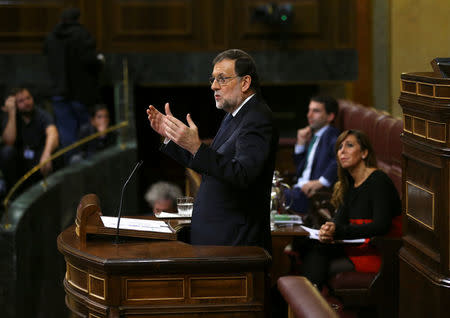Spain's Rajoy looks to Saturday vote to form new government
By Angus Berwick and Carlos Ruano MADRID (Reuters) - Spain's opposition parties warned acting Prime Minister Mariano Rajoy he will face a challenging second term if, as expected, he wins a parliamentary confidence vote on Saturday after losing a first ballot on Thursday. The Socialist party has agreed to abstain in the second vote, which was called automatically after Rajoy fell six votes short of the majority he needed in Thursday's first parliamentary vote. The Socialists' planned abstention on Saturday evening, when Rajoy only needs more votes in favor than against, should allow him to form a minority conservative government and end more than 300 days of political paralysis. Socialist leaders made clear during a heated debate on Thursday, in which fellow opposition party Podemos at one point stormed out of the chamber, that they would not give Rajoy a free hand to govern and would fight his austerity policies. Rajoy's People's Party (PP) won two national elections in December and June but without a majority, and efforts to form a coalition in a fragmented parliament failed. On Wednesday, he urged opponents to work with him to avoid yet another election in the near future. During a second term, Rajoy, who has led the PP since 2004, will need support from opposition parties to pass legislation to tackle mounting challenges and restore Spain's international stature. A top priority will be shrinking Spain's budget deficit to meet the 2017 target agreed with Brussels, which requires at least 5 billion euros ($5.46 billion) of either cuts or extra revenues. "You will not dominate parliament, the majority you lack will triumph and a lot of the time it will align with the PSOE (the Socialists)," said Antonio Hernando, a senior Socialist member. "GOVERNMENT THAT CANNOT GOVERN" The Socialists remain deeply split over their abstention in Saturday's vote, approved by a majority of their senior members last Sunday. The party's Catalan wing has already said it will vote "no" on Saturday. The former Socialist leader, Pedro Sanchez, who resigned on Oct. 1 after a party revolt over his refusal to enable a Rajoy-led government, could resign his seat in parliament before Saturday's vote to avoid having to break with his party's line on abstaining, a party source close to Sanchez said. Sanchez would then campaign to be nominated again as party leader at a party conference in coming months, the source said. Rajoy urged the Socialists and Podemos on Thursday not to reverse his economic reforms. He offered an olive branch to the opposition, saying he was willing to compromise and strike a national pact on reforming Spain's struggling education system. "Having a government that cannot govern is just as bad as not having a government," Rajoy told lawmakers before the vote. Podemos' head Pablo Iglesias, who has called for protesters to surround parliament for Saturday's vote, laid claim on Thursday to lead the opposition to Rajoy's incoming administration. He denounced the Socialists as partners of the PP, which he brands as corrupt and committed to austerity. "There are more potential criminals in this chamber than there are outside," Iglesias said to jeers from other politicians. (Additional reporting by Inmaculada Sanz; Editing by Adrian Croft and Andrew Roche)




